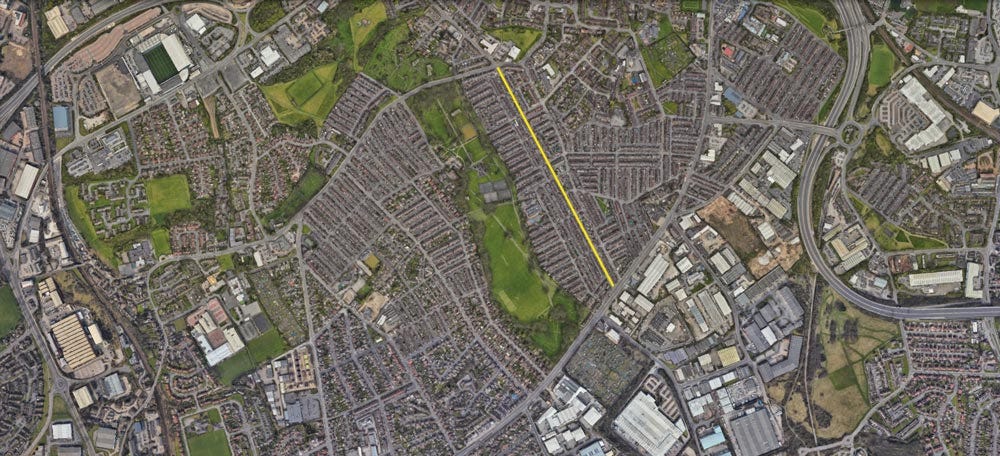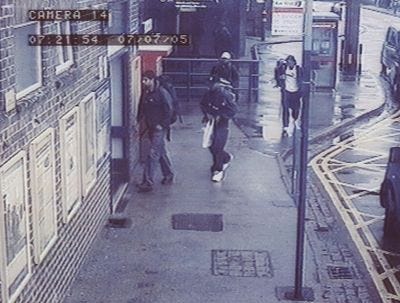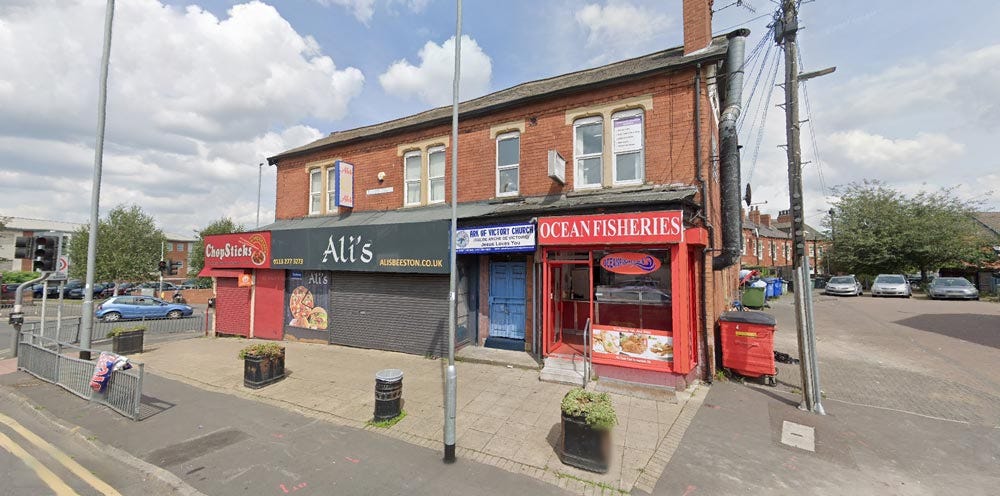This poem was written in the aftermath of the July 7th attacks and published in the liberal-left Independent newspaper on the 21st of August 2005. It can be seen as a companion piece to Next Door (1981), and as with that poem, we will go through it stanza by stanza.
Shrapnel concerns a World War II bombing raid on the night of the 14th of March, 1941, on Harrison’s area of Leeds.
Beeston had, in the late 19th Century, been described as working-class. By Harrison’s time (the 1940s) it had risen to “respectable working-class”. I have seen several people who lived there in the 1960s describe it as middle-class and even “posh”. This paints a steady upward trajectory. Tempest Road, where Harrison’s family lived, was seen as particularly select, with working-class kids being shooed away from it in the 1960s. However, since that time, with de-industrialisation and multiculturalism, Beeston has declined severely. It is now generally regarded as a bad area with lots of crime, deprivation and diversity.
Cross Flatts Park is a long, 44-acre amenity next to Beeston. Originating in the late Victorian period, it is parallel with the full length of Tempest Road.
A summer day with all the windows wide
when suddenly a storm-presaging breeze
makes the scribbled papers that I’m sorting slide
on to the floor. They’re these you’re reading, these.
I rummage through my many paperweights,
grandad’s knuckleduster, this one from Corfu -
a rosette from the Kaiser’s palace gates,
and shrapnel from an air-raid I lived through.
While Harrison is trying to write, a piece of shrapnel that he collected as a boy reminds him of an air raid he experienced in World War II.
Down in our cellar, listening to that raid,
those whistles, those great shudders, death seemed near,
my mother, me, my sister, all afraid
though my mother showed us kids no sign of fear.
Maybe the blackout made the ground too dark
for the aimer to see the target for his load
but all the bombs fell on to Cross Flatts Park
and not on to our house in Tempest Road.
They went down into their cellar for protection during the air raid. His mother made sure to stay calm so as not to frighten her children.
All the lights below being switched off might have made it impossible for the bomber to aim properly. All of his bombs landed, not on houses, but on the adjacent park.
And not on to our school, Cross Flatts CP.
A hit would mean no school and I’d be spared
old “Corky” Cawthorne persecuting me.
If he’d ‘ve copped a bomb would I have cared?
“Don’t talk like that!” I heard my mother chide
though she didn’t know that Corky used to tell
her frightened little son that when he died,
because not christened, he would go to hell.
The bombs didn’t land on Cross Flatts Community Primary school, so it remained open and Harrison had to suffer his teacher Corky, who used Christian dogma to torment children.
On the rare occasions that I chose to speak
in Corky’s RI class I’d make him mad,
trying out bits of calculated cheek
and end up being called “a wicked lad”.
Sir, if you’ve had your legs off, sir, like say
poor Mr Lovelock down Maude Avenue
will you get ‘em back on Judgement Day?
Does God go round and stick ‘em back wi’ glue?
Corky handled religious instruction (“RI”). Harrison was precocious and intelligent enough to notice absurdities in religious dogma - the doctrines that don’t make sense, the threats that are obviously manipulative, the promises that can’t possibly be fulfilled.
Corky Cawthorne’s cruel and crude RI
put me off God for life. I swore I’d go
neither to Hell below nor Heaven on high,
and Beeston was all of both I’d ever know.
He also taught music which he made me hate,
not quite as much as God, into my teens.
I’d never ‘ve come to music even late
if that raid had blown me into smithereens.
The child Harrison was galvanised against religion partly by how Corky used it. As it happens, directly opposite the Harrison household was a church, the Church of the Holy Spirit. It closed in 2012 and has been derelict ever since, and now somebody wants to use it as the base for an online clothing business. No doubt Corky would be incensed, and young Harrison would be very amused. (But what about old Harrison?)
Corky also taught music and turned Harrison off that, as well. He notes that, had the German bomber aimed differently, he would have never got a chance to overcome his prejudice against music and learn to love it.
A term used now, “bobby”, is a local policeman. “Gerry” was a slang term for German soldiers.
I went to see the craters the bombs made
first thing in the morning and us lads
collected lumps of shrapnel from the raid
to prove we’d seen some war to absent dads.
There was a bobby there who didn’t mind
craters being used by kids so soon for play
or hunting for shrapnel that he helped us find.
Clutching my twisted lump I heard him say:‘appen Gerry must’ve been ‘umane
or there’d ‘ve been a bloodbath ‘ere last neet.
They’d be flattened now woud t’ ‘ouses in Lodge Lane,
Tempest Road, all t’ ‘arlechs, Stratford Street.
He dumped his bombs in t’park and damaged nowt
missing t’ rows of ‘ouses either side.
‘umane! ‘umane! And ‘im a bloody Kraut!
And but for him, I thought, I could have died.
The policeman exclaimed that the German bombardier must have been humane, because he could so easily have dropped his bombs on the many houses but instead dropped them on the park. There must have been a lot of damage there, because the policeman believed it would have devastated the residential areas.
He named both Tempest Road and Stratford Street. Harrison’s house was at the very intersection of those two.
So now I celebrate my narrow squeak,
the unseen foe who spared our street in Leeds,
and I survived to go on to learn Greek
and find more truth in tragedy than creeds.
I stroke my shrapnel and I celebrate,
surviving without God until today,
where on my desk my shrapnel paperweight
stops this flapping poem being blown away.
Just as the bomber’s aim allowed Harrison world enough and time to accept music, so he was also able to learn Greek, and read the Western canon, and travel and come to know much more of the world than Beeston. He says that he has found more truth in literature than in religion.
He celebrates - or claims to celebrate - “surviving without God until today”, which, perhaps accidentally, implies that it is an achievement to do so.
A flicker of faith in man grew from that raid
where this shrapnel that I’m stroking now comes from,
when a German had strict orders but obeyed
some better, deeper instinct not to bomb
the houses down below and be humane.
Our house, thanks to that humane bombardier,
still stands: and that of Hasib mir Hussain,
Mohammad Sidique Khan, Shehzad Tanweer.
A faith in the goodness of man, which is perhaps the basis for his Humanism, came alive because of the raid, where a foreign man could and, formally, should have killed the people of Beeston, but instead chose to let them live. As a result, Harrison’s house survived that night and still stands six decades later in 2005, and so do all the houses of Lodge Lane, Tempest Road, all the Harlechs, and Stratford Street. Among those houses are the three belonging to men called…
Suddenly, at the very end of the poem, come three names that are completely incongruous with all of the preceding text. They are neither English nor German; they are no sort of European. They are the names of the three Pakistani suicide bombers who perpetrated the July 7th attacks in London, killing 52 people and injuring more than 770, many of them permanently maimed.
We have been ripped away from the cosy, quaint past and are now looking at the cold, brutal present.
But what is the connection? As Harrison alludes, these three men grew up in Beeston, Leeds - the same area where he had grown up three generations before. This makes them Loiners, like him - technically.
In fact, two of them grew up on his street, Tempest Road, and Tanweer’s father owned a takeaway shop at no.1. Tanweer and Khan played sports in Cross Flatts Park. Moreover, all three men frequented the Stratford Street mosque, right opposite Harrison’s childhood house. All three were also associated with the Hamara Youth Access Point which is just on the next block along Tempest Road; Khan acted as a “mentor” there, using it as his primary way to find Islamist recruits. For Harrison, it could hardly be any “closer to home” than this.
The contrast Harrison draws in the poem’s conclusion is between the goodness of a German bombardier in 1941 and the ruthlessness of those Muslim suicide bombers in 2005. The “irony” is that the German did not know the people he saved, did not live among them, did not speak their language and in all likelihood had never spent a day in their country, yet he saved them anyway, due to what Harrison sees as a humane impulse, while the suicide bombers lived among their victims, spoke their language and had grown up in their country… yet slaughtered them anyway. But this is not irony; it is the reality of human division by race and religion.
Harrison is acknowledging that reality - part of it - when he rails against the religious instruction he endured at school at the hands of Corky Cawthorne. He is finding the source of division and the cause of murderousness to be religion - “the root of all evil”.
There is truth to this. The three Beeston Pakistanis were joined in their atrocity by a Black man, Germaine Lindsay. The browns and the black were both against whitey, but they weren’t against each other. Moreover, Lindsay was in a relationship with a White British woman who had converted to militant Islam. This strongly suggests that race was not the salient division, but religion.
You could, if you wanted to really miss the point, notice that Lindsay and his Pakistani colleagues all grew up in Yorkshire, and suggest therefore that 7/7 was an attack by Northerners against Southerners. That would be droll. You could even invoke the “Four Yorkshiremen” sketch, implying that these four men who grew up in Yorkshire were Yorkshiremen. Thankfully, Harrison does not do this.
But he doesn’t do anything. There is no more; the poem ends with the three exotic names. We readers are left to contemplate.
Harrison’s point, presumably, is that he managed “surviving without God until today”, and the three brown men could have done likewise - and then, without Islam to direct them, they wouldn’t have gone on their killing spree. These new sons of Beeston would have been pacifist, like him.
What I would say about this is that their objection to the West - which was the motive for their terrorism - was not really religious, but ethnic. They did not like what Western countries, especially Britain, had done to their ancestral lands. Doubtless religion came into it too, but the burning visceral anger was, first and foremost, racial. Religion becomes the rationale for us to do the things our blood compels us to do.
An obvious exception here is, of course, Samantha Lewthwaite, the White woman who joined militant Islam. I believe she is simply deranged, a psychotic looking through a tourist catalogue of ways to escape, offend and harm her own kind. In her case (which is very rare) religion became the means and the rationale for her to reject what she is. No doubt the rabid fanaticism is what it takes to ignore the constant calling of one’s own blood.
Shehzad Tanweer’s father sold his takeaway shop immediately after the July 7th attacks. It was at the very start of Tempest Road. Seventeen years later the block looked like this:
One beholds an incredible range of cultures just on this small block of Victorian terraced housing: a Chinese takeaway, then a brown guy (Ali) selling pizzas and hamburgers, then an obscure Christian sect of Francophone Africans, then a “traditional” English chippie owned by a Pakistani and previously owned by one who was the father of an Islamist suicide bomber. Above the chippie is an insurance specialist, in rooms once occupied by said bomber’s partners-in-jihad.
This humble red-brick block, built by English hands, is now successfully diverse - there are no English people at all. No Europeans, in fact.
Here (on the left) is the very same block a century ago. What would the people of Beeston then think of it today?
I am not a socialist and I do not claim to be “the people’s” anything, but I will say what Tony Harrison should have said in Shrapnel: the people he grew up around would be horrified by Beeston today - even without knowing of its connection to terrorism. Religion would also be irrelevant. For them, the glaring division would be race. They would be wondering where they, the English, were in the streets and houses they had known.
In fact, what would the German bombardier have thought, if the lights below had been switched on and he had looked down and seen this multicultural block? His first thought would surely be that the English must have gone mad. He would report that there was no need to bomb the English - they had already destroyed themselves! He would be baffled. But then he would remember the propaganda he had heard back home about the English - that their government had flagrantly lied to them. And then perhaps the multiculturalism below, the utter absence of the English, would make sense.
For Tony Harrison and his readers, it still doesn’t make sense.
But that is at least partly because Harrison, in his role as poet, does not even try to make sense of it. He does not ask how the situation came about - how Hussain, Khan and Tanweer came to be living on Tempest Road. He accepts that such men simply are here now, and asks only whether the Humanism which exposed the English to murderous Muslims can be successfully transmitted to them, so that they too will enjoy the smug bliss of having nothing to kill or die for. In the meantime, castrated by a nihilism he does not even recognise, he congratulates himself on not falling for the lies of a religion (while falling for the lies of a religion).
By this time, Tony Harrison was 68. A man of his age and intellect should have known better. He should have asked the question. But neither he, nor the progressive nihilists he simultaneously despised and sought to impress, ever did.
To ask it would, after all, be a sin.









Thanks so much for such a thoughtful analysis of ‘Shrapnel’. I do recall the poem being published soon after the mass slaughter of 7/7. I was keen to read it as I’d been interested in Harrison’s work for some years by that time.
Harrison had long addressed the topic of conflict - 1992’s ‘The Gaze of the Gorgon’ explores the dehumanising effect of conflict from WW1 to the first Gulf War. It even includes a poem written from the point of view of a dead Iraqi soldier, stressing the futility of war. Harrison went on to attack both Tony Blair and George W Bush in ‘The Krieg Anthology’. Harrison would have viewed 7/7 as the inevitable consequence of Western war-mongering in Muslim countries. By 2005, only the most naive of people would have considered an attack such as 7/7 unthinkable.
‘Shrapnel’ was, of course, written and published before the 7/7 bomber Khan’s statement appeared on al-Jazeera on 1st September, declaring the attack was in retaliation for the UK and US’s ‘War on Terror’ post 9/11 - their war on ‘my people’ as Khan puts it. That Harrison names the terrorists but goes no further with any condemnation, is to be expected given that he always remains wedded to the left. He won’t view the heinous crime committed against the British in terms of race, but he will recognise the ethnic struggle of others.
"Harrison, in his role as poet, does not even try to make sense of it. " Likely that if he tried, he'd never be published. 'Wrongthink,' you know. Fascinating how all the might of the German Military could not break Britain, but a bunch of ignorant Muslim fanatics brought in by 'fanatical' British liberals could.